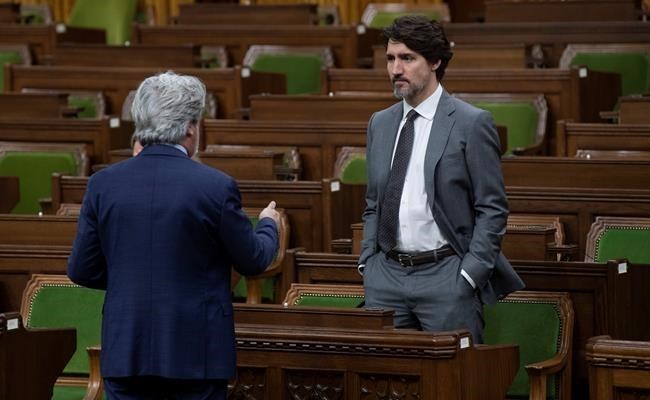
Prime Minister Justin Trudeau speaks with Leader of the Government in the House of Commons Pablo Rodriguez as they wait for the COVID-19 committee in the House of Commons Chamber Wednesday April 29, 2020 in Ottawa. THE CANADIAN PRESS/Adrian Wyld
Republished April 30, 2020 - 4:37 PM
Original Publication Date April 30, 2020 - 1:01 AM
TORONTO - COVID-19 has now spread to every region in Canada, with Nunavut reporting its first case on Thursday, as Ontario reported its largest one-day climb in fatalities and the country's budget officer predicted a flood of red ink.
The case in northern Nunavut was identified in the 1,600-strong largely Inuit community of Pond Inlet on Baffin Island. The territory's chief public health officer, Dr. Michael Patterson, said a rapid response team was on its way to the community to help manage the situation.
"No-one wants this virus; no-one brought this virus to Nunavut on purpose; no-one deserves to be shamed or blamed," Premier Joe Savikataaq said. "Now is the time for patience, kindness and staying at home."
Word of the first case in the northern territory came as Ontario passed the 1,000-death mark. Another 86 people had died, for a total of 1,082, although the overall jump in new cases was relatively modest. Quebec reported 98 new deaths — most of them in long-term care homes — for a total of 1,859.
Overall, Canada has now seen more than 52,000 cases. More than 3,000 of those have been deadly.
In response to the crisis, the federal government has opened its spending taps in an effort to keep the system from total collapse. The cost of propping up the economy was thrown into stark relief on Thursday when Parliament's budget watchdog pegged the deficit at a staggering $252-billion.
The report by budget officer Yves Giroux takes into account almost $146 billion in spending measures announced so far, and says even more might be needed if the economy recovers too slowly. The deficit figure, according to the office, was based on an expectation the economy would shrink 12 per cent this year.
Much of Prime Minister Justin Trudeau's daily briefing, normally devoted to the government's fight against the pandemic, was instead taken up by the crash of a Canadian military helicopter off the coast of Greece during a NATO training exercise. At least one crew member — Sub-Lt. Abbigail Cowbrough — was killed and five others were missing.
Trudeau did say the government's priority was to support those Canadians who have taken a financial hit because of anti-pandemic measures. The restrictions, he said, would allow the economy to "come roaring back" once the epidemic has been curtailed.
"We need Canadians to stay home," Trudeau said. "Our focus needs to be on how we get through right now."
The restrictions, which have grounded much of the world's commercial aviation, have also had a profound impact on Canada's airports. Some have resorted to terminal closures and layoffs, while at least six regional facilities have lost scheduled passenger service altogether.
The organization that speaks for 100 airports across the country said they expected losses of around $2 billion this year. The Canadian Airports Association for government help to keep them aloft until demand returns.
Vancouver's airport authority said it would start offering voluntary layoffs to its 500 staff, with layoffs expected to follow.
As provinces look to get on the road to post-pandemic normalcy, the country's chief public health officer acknowledged people were getting antsy to get out of their homes. While the COVID-19 curve had been "a little flat" this week, Dr. Theresa Tam warned of still significant challenges in settings such as long-term care homes.
Alberta released its plan to lift some restrictions starting as early as Monday, when dentists and physiotherapists could reopen as well as golf courses.
Some retail businesses, restaurants, hair salons, museums, daycares and summer camps have been given a target date of May 14.
The Alberta relaunch plan comes with restrictions. One will require people to wear masks on mass transit.
In Ontario, Premier Doug Ford said he understood people's anxiety about getting back to normalcy. Doing so, he said, would happen as quickly as possible but only in a safe and measured manner with public health considerations in the forefront.
"We're on the path to reopening the economy," Ford said. "There's a light at the end of the tunnel."
Prince Edward Island, which has had 27 cases in all and reported no new ones Thursday, said it was still not the time for non-essential travel to the province. Newfoundland and Labrador, which also announced no new cases, said it had reached a turning point and a start to reopening would happen next month if the positive trend continues.
New Brunswick also reported no new cases — for a 12th straight day.
-With files from Canadian Press reporters across the country.
This report by The Canadian Press was first published April 30, 2020.
News from © The Canadian Press, 2020